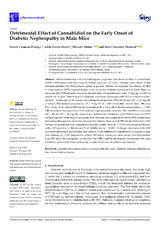Mostrar el registro sencillo del ítem
Detrimental Effect of Cannabidiol on the Early Onset of Diabetic Nephropathy in Male Mice
| dc.contributor.author | Carmona Hidalgo, Beatriz | |
| dc.contributor.author | García-Martín, Adela | |
| dc.contributor.author | Muñoz, Eduardo | |
| dc.contributor.author | González-Mariscal, Isabel | |
| dc.date.accessioned | 2021-09-30T10:18:22Z | |
| dc.date.available | 2021-09-30T10:18:22Z | |
| dc.date.issued | 2021 | |
| dc.identifier.uri | http://hdl.handle.net/10396/21733 | |
| dc.description.abstract | Anti-inflammatory and antidiabetogenic properties have been ascribed to cannabidiol (CBD). CBD-based medicinal drugs have been approved for over a lustrum, and a boom in the commercialization of CBD products started in parallel. Herein, we explored the efficacy of CBD in streptozotocin (STZ)-induced diabetic mice to prevent diabetic nephropathy at onset. Eight-to-ten-week-old C57BL6J male mice were treated daily intraperitoneally with 10 mg/kg of CBD or vehicle for 14 days. After 8 days of treatment, mice were challenged with STZ or vehicle (healthy-control). At the end of the study, non-fasting blood glucose (FBG) level was 276 ± 42 mg/dL in vehicle-STZ-treated compared to 147 ± 9 mg/dL (p ≤ 0.01) in healthy-control mice. FBG was 114 ± 8 mg/dL in vehicle-STZ-treated compared to 89 ± 4 mg/dL in healthy-control mice (p ≤ 0.05). CBD treatment did not prevent STZ-induced hyperglycemia, and non-FBG and FBG levels were 341 ± 40 and 133 ± 26 mg/dL, respectively. Additionally, treatment with CBD did not avert STZ-induced glucose intolerance or pancreatic beta cell mass loss compared to vehicle-STZ-treated mice. Anatomopathological examination showed that kidneys from vehicle-STZ-treated mice had a 35% increase of glomerular size compared to healthy-control mice (p ≤ 0.001) and presented lesions with a 43% increase in fibrosis and T cell infiltration (p ≤ 0.001). Although treatment with CBD prevented glomerular hypertrophy and reduced T cell infiltration, it significantly worsened overall renal damage (p ≤ 0.05 compared to vehicle-STZ mice), leading to a more severe renal dysfunction than STZ alone. In conclusion, we showed that CBD could be detrimental for patients with type 1 diabetes, particularly those undergoing complications such as diabetic nephropathy. | es_ES |
| dc.format.mimetype | application/pdf | es_ES |
| dc.language.iso | eng | es_ES |
| dc.publisher | MDPI | es_ES |
| dc.rights | https://creativecommons.org/licenses/by/4.0/ | es_ES |
| dc.source | Pharmaceuticals 14(9), 863 (2021) | es_ES |
| dc.subject | Cannabinoid | es_ES |
| dc.subject | Streptozotocin | es_ES |
| dc.subject | Phytocannabinoid | es_ES |
| dc.subject | Type 1 diabetes | es_ES |
| dc.subject | Endocannabinoid system | es_ES |
| dc.subject | Chronic kidney disease | es_ES |
| dc.title | Detrimental Effect of Cannabidiol on the Early Onset of Diabetic Nephropathy in Male Mice | es_ES |
| dc.type | info:eu-repo/semantics/article | es_ES |
| dc.relation.publisherversion | https://doi.org/10.3390/ph14090863 | es_ES |
| dc.relation.projectID | Junta de Andalucía. PI-0318-2018 | es_ES |
| dc.relation.projectID | Gobierno de España. SAF2017-87701-R | es_ES |
| dc.rights.accessRights | info:eu-repo/semantics/openAccess | es_ES |

